Health Insurance
57% of Americans Would Be Willing to Pay to Move Up in the COVID-19 Vaccination Line
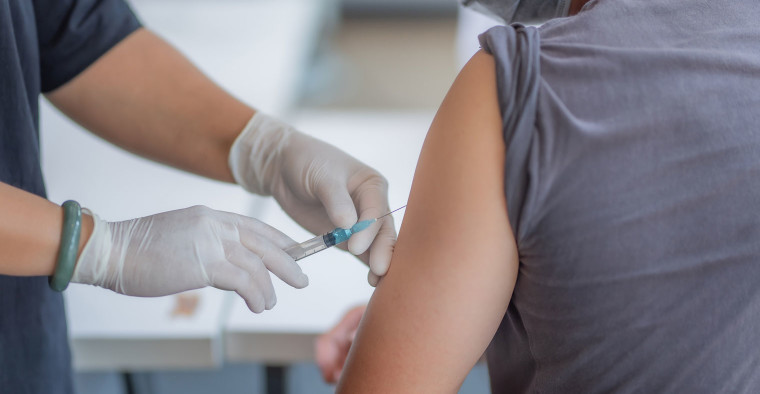
After a year of living in a pandemic, the public's desire for a COVID-19 shot is producing conflicting feelings about queue-jumping and a readiness to bargain for a chance at moving up in the line for a vaccine.
Most Americans don't believe that people should be able to pay to get earlier access to a vaccine, nor do they think it's fair if high-profile individuals use their celebrity to get vaccinated ahead of time. At the same time, 57% admitted that they'd pay to jump ahead of the line, according to the latest ValuePenguin survey of more than 1,000 consumers. And 26% said they've taken on a second job to qualify for an earlier vaccine.
Meanwhile, more than one-third of people expressed feeling jealous or resentful about those in their lives who were vaccinated before them. These feelings were most prevalent among Gen Xers and millennials, who were also the most likely to say they would get the vaccine tomorrow even if it deprived a higher-risk individual of a dose.
Key findings
- While most Americans don’t think people should be able to pay to get a COVID-19 vaccine earlier than normal, 57% admit they’d pay to move up in line. More than 10% would shell out $500 or more to secure a spot.
- 27% of Americans would give up alcohol for a year if it meant they could get the COVID-19 vaccine tomorrow. Some would also give up Netflix (23%), video games (22%) and watching sports (22%). Consumers were least willing to sacrifice listening to music (10%), sex (14%), shopping (15%) and recreational drugs (16%).
- More than a quarter (26%) say they’ve taken on a second job to qualify for a COVID-19 vaccine earlier than they would have. An additional 18% will consider doing so.
- Likewise, 60% think it’s unfair if celebrities and other high-profile individuals have been able to get vaccinated before them.
- 35% of Americans have felt jealous or resentful toward people in their life who have been vaccinated before them. Gen Xers (50%) and millennials (46%) feel more jealousy than any other generation.
1 in 8 Americans would pay $500 or more if it meant they could get a COVID-19 vaccination tomorrow
The COVID-19 vaccination costs nothing (though about one-third of people believe they have to have insurance to get it), but most people would still be willing to pay money to secure a dose if it were available tomorrow. In fact, 57% of people would be willing to pay for a dose.
Twenty-three percent said they would pay no more than $99 for a vaccine. Another 22% set their limit between $100 and $499, while another 12% said they would pay $500 or higher for a vaccination. Conversely, more than 4 in 10 weren’t willing to pay for a vaccine. In fact, nearly double the percentage of women — 57% — said they wouldn’t pay any money for a vaccine than men (29%).
Gen Xers were willing to pay the most money for a vaccine, as 20% would pay $500 or more.
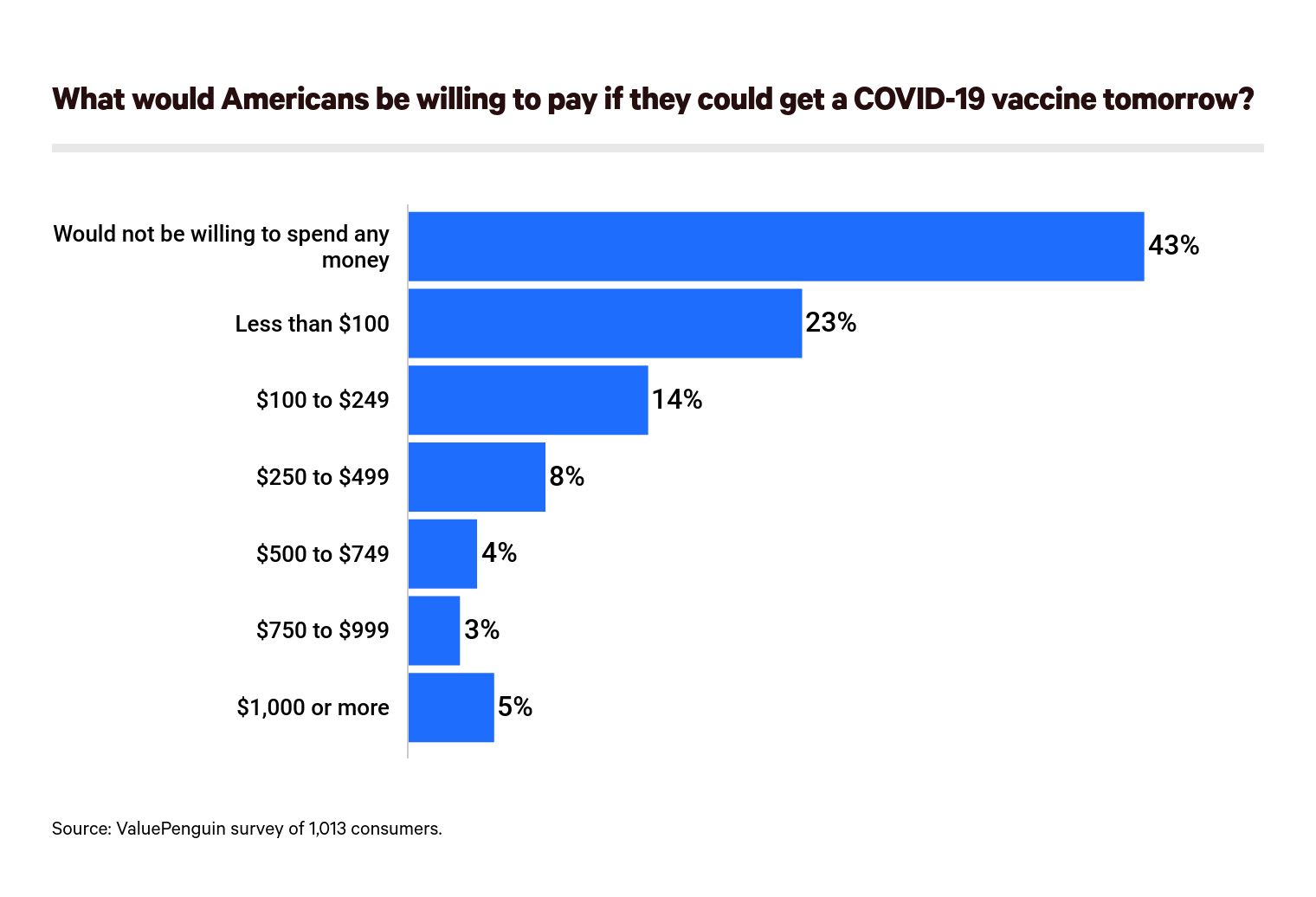
Along with expressing a willingness to part with cash in exchange for a vaccine, many also emphasized an openness to make sacrifices if it meant getting inoculated against COVID-19. Twenty-seven percent said they wouldn't drink alcohol for a year if it meant getting a vaccine.
Other popular answers to this question were watching Netflix (23% said they'd give up streaming for a year for a vaccine), playing video games (22%), watching sports (22%), drinking coffee (21%) and eating fast food (20%). On the other hand, fewer wanted to give up listening to music (10%), having sex (14%), shopping (15%) and taking recreational drugs (16%).
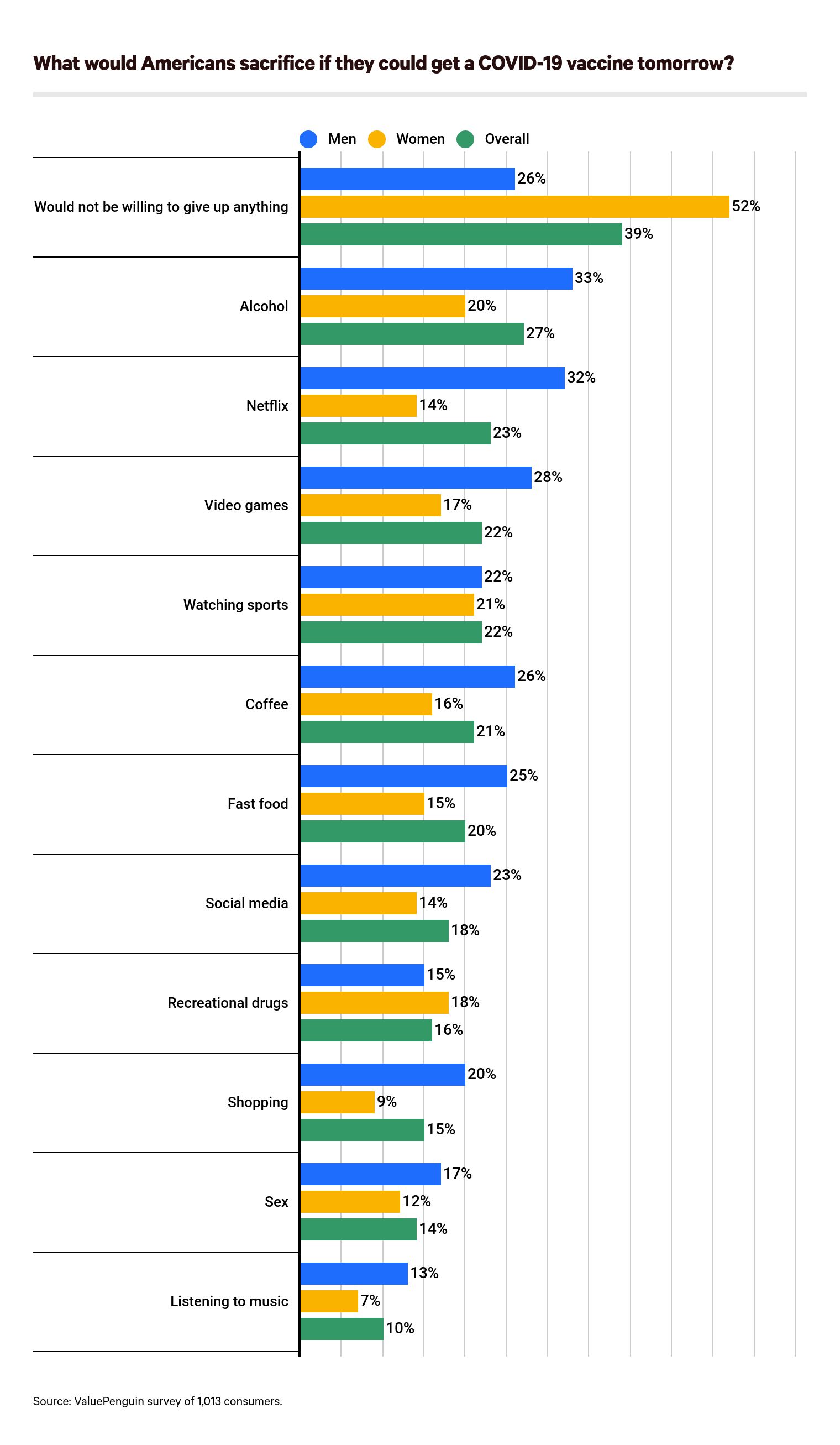
People generally don’t approve of celebrities or people with financial means getting early vaccine access, creating a conflict with their own behavior.
Consumers voiced disapproval when asked about people using their influence or money to get early access to vaccines. Sixty percent believe it's unfair that celebrities have been able to get vaccinated before them. Similarly, 61% believe people shouldn't be allowed to use their money to jump ahead of others in line.
While 61% don't think people should be able to pay to speed up their access to a COVID-19 vaccine, 57% admitted they would buy a chance to move up in line if they could.
At the same time, 58% would get vaccinated tomorrow, even if high-risk populations wouldn't have the same opportunity. Twenty-two percent of these consumers said they wouldn't feel any guilt.
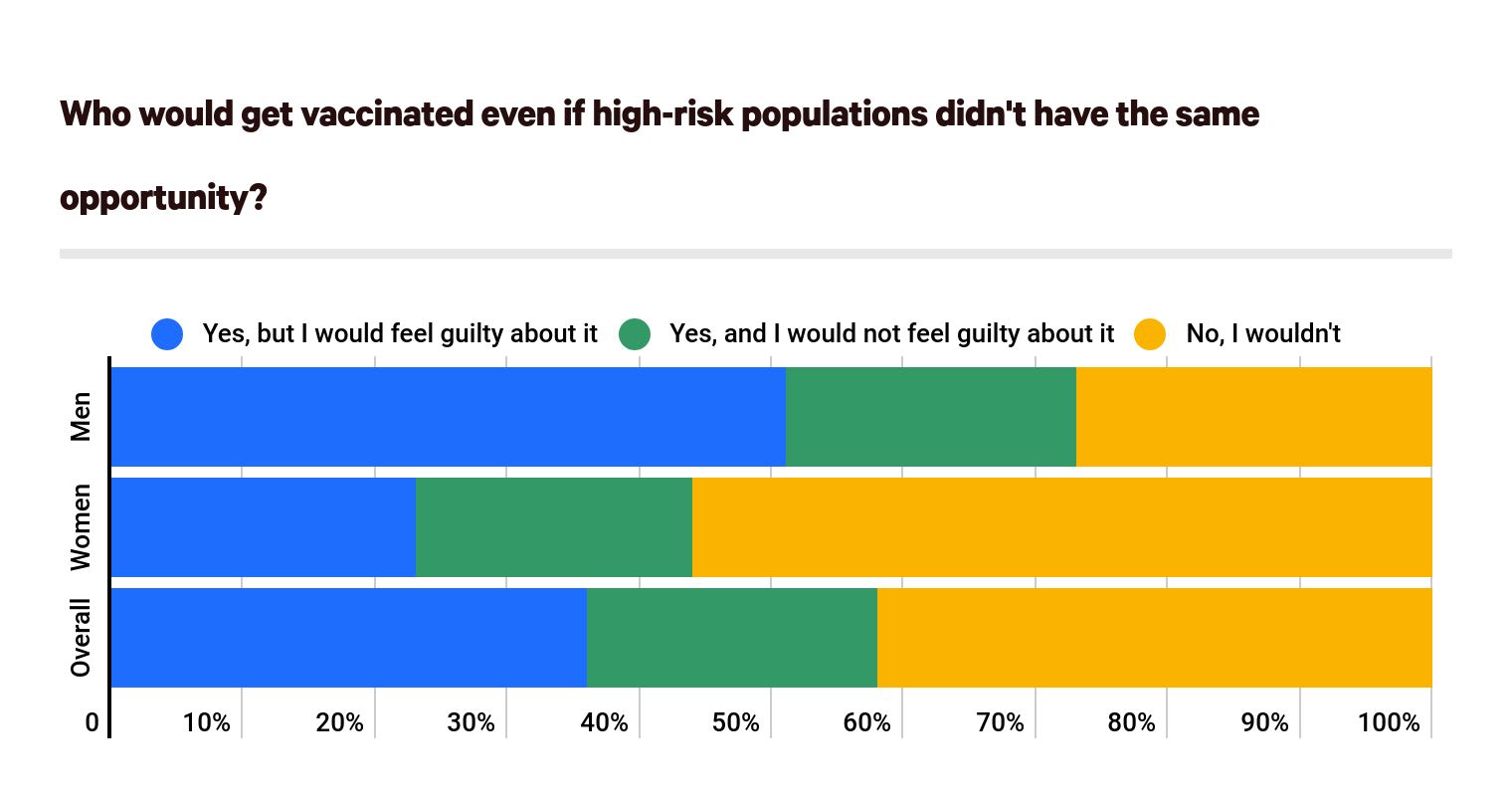
Men (51%) were more than twice as likely than women (23%) to say that they'd get the shot with the knowledge that a high-risk person might not. Twenty-two percent of men would get it and not feel bad, while just 20% of women said they would get vaccinated guilt-free.
Moreover, more than a quarter of people admitted to taking on a second job to qualify for a COVID-19 vaccine earlier than they otherwise would have. Twenty-six percent of consumers revealed taking this action, while another 18% would consider doing so.
Gen Xers (42%) and millennials (33%) were significantly more likely to take on a second job to jump ahead in the wait for a vaccine, compared with Gen Zers (11%) and baby boomers (5%). Though, depending on their age and individual health, boomers would be more likely to have qualified for a vaccine already.
Men (44%) were also far more likely than women (9%) to take on or be open to taking a second job to qualify for early access to a vaccine. At the same time, 74% of women wouldn't take advantage of distribution loopholes this way, and just 37% of men said the same.
Do you need to pay money for a vaccine? No. Those who want the vaccine don't need to pay or have health insurance coverage to get vaccinated against COVID-19 right now. Patients could be charged if the administration of the vaccine was part of a larger visit, such as a physical, but the vaccination in this case would still be free.
More than 1 in 3 acknowledged jealousy and resentment after others in their lives got vaccinated before them
More than one-third (35%) of people have felt jealousy or resentment toward people in their lives who have been vaccinated before them.
Men were far more likely to feel resentment or jealousy over access to the COVID-19 vaccine. Fifty-two percent of men said these feelings manifested after someone in their lives got the shot before them. On the other hand, 82% of women denied having the same feelings of resentment or jealousy.
More than three-fourths (76%) of Gen Zers have no feelings of resentment or jealousy toward those they know who got vaccinated before them.
Gen Xers (50%) were the most likely demographic to admit to directing resentment or jealousy toward others in their lives for getting a vaccine before them. Forty-six percent of millennials said the same.
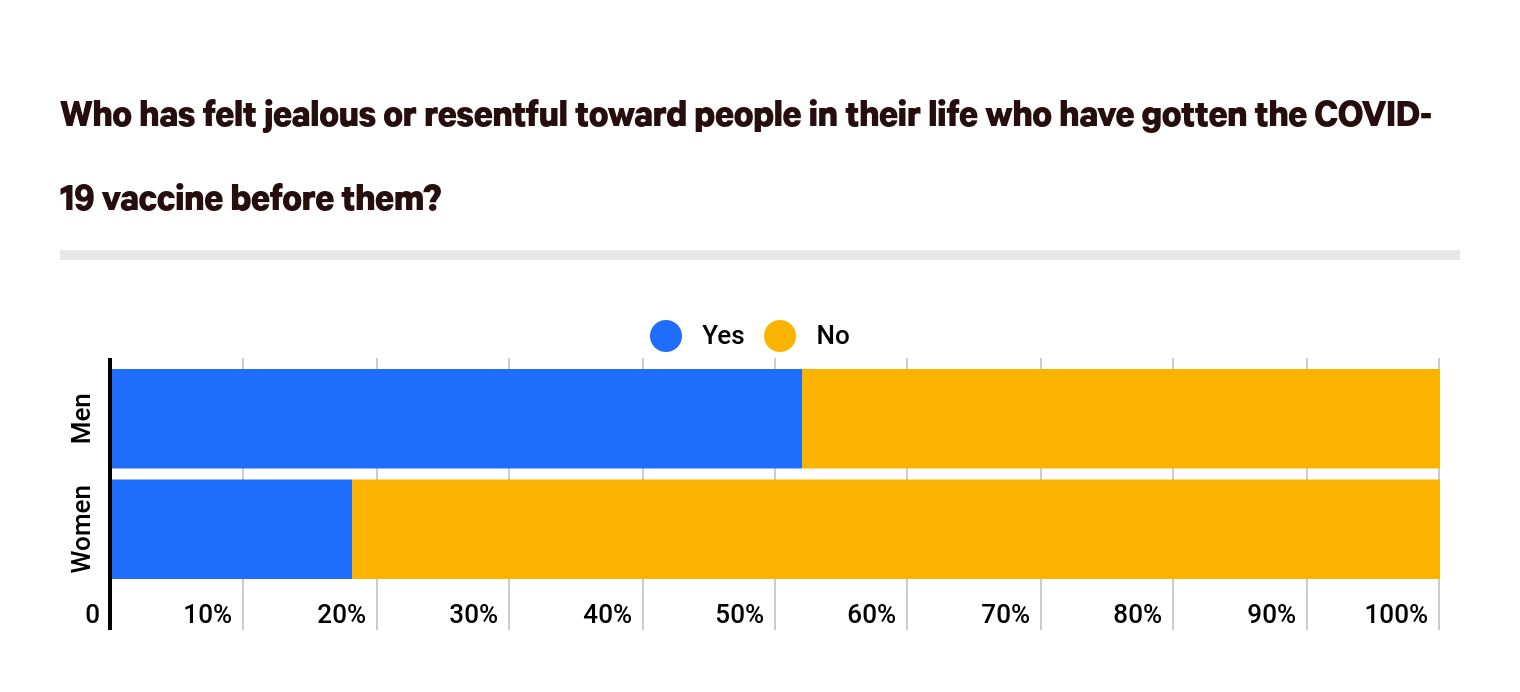
Methodology
ValuePenguin commissioned Qualtrics to conduct an online survey of 1,013 U.S. consumers from Feb. 26 to March 1, 2021. The survey was administered using a non-probability-based sample, and quotas were used to ensure the sample base represented the overall population. All responses were reviewed by researchers for quality control.
We defined generations as the following ages in 2021:
- Generation Z: 18 to 24
- Millennial: 25 to 40
- Generation X: 41 to 55
- Baby boomer: 56 to 75
While the survey also included consumers from the silent generation (defined as those 76 and older), the sample size was too small to include findings related to that group in the generational breakdowns.
